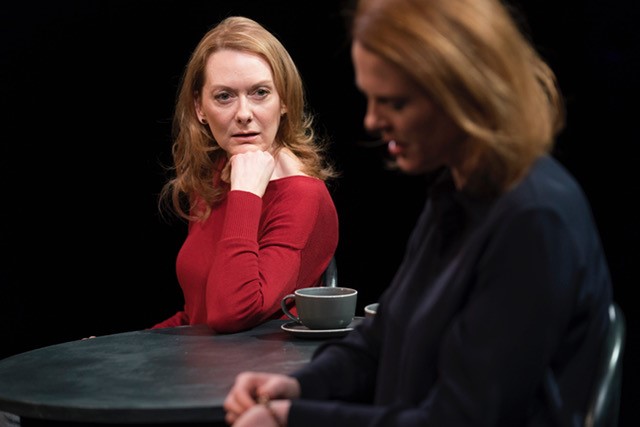Mark O’Rowe would like you to pay attention, please. Because if you’re not paying attention to The Approach, running at the Project Arts Centre in a production which is also directed by O’Rowe, you risk missing the meat of this drama. It is underneath the oftentimes banal exchanges between three women, played with extraordinary conviction by Derbhle Crotty, Aisling O’Sullivan and Cathy Belton, that the heartbreak of this play is to be found.
The Approach consists of three duologues and an epilogue between the characters, and largely centres on the rift that has sprung up between Anna and Denise, estranged sisters who fell out many years ago over a boyfriend. Initially, neither woman shows signs of relenting in their separate conversations with Belton’s character, Cora, who used to live with the two sisters. However, the siblings eventually reunite in the final duologue. This information in no way constitutes a spoiler as the real narrative tension of the play comes from the almost unnoticeable details which pepper the conversation. As years pass between the conversations, one can plot a timeline of what has happened to the women if one pays close attention. There is one particularly heartbreaking detail about what occurred to Crotty’s character that is all the more devastating for how brief and light the allusion to it is.
It seems superfluous to mention the extremely high standard of the acting on display. Crotty, in particular, shines with the kind of warmth and passion she brings to many of her roles. O’Sullivan and Belton seem a little stilted in the first duologue, possibly because it takes them a moment longer to adapt to the highly naturalistic dialogue (which is good but never really good), or because the audience takes a moment to acclimatise to it. As the play progresses, however, Belton reveals a quiet study in loneliness, and O’Sullivan a brittle but emotive character.
O’Rowe’s depiction of three middle-aged women may not be the most deep and wide-ranging ever written – they do spend a large portion of their time discussing men – but there is a certain truth to their characterisation. For a certain class and generation of woman represented by the three actresses, the onset of old age, and indeed, as the play suggests, death, can be countered only by male companionship. Belton’s repeated reminiscences about their heyday of female friendship is deeply affecting, and her abortive efforts to reignite that spark are all the more crushing for it.
The play reveals its cyclical nature at its conclusion, suggesting perhaps that these conversations go on ad infinitum. And O’Rowe would like you to listen very, very carefully to them.







